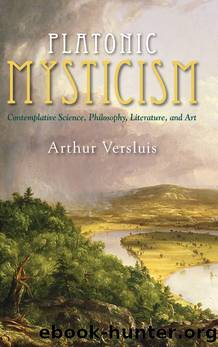Platonic Mysticism by Versluis Arthur

Author:Versluis, Arthur
Language: eng
Format: epub
Publisher: State University of New York Press
Published: 2017-01-14T16:00:00+00:00
CHAPTER FIVE
On Literature and Mysticism
In Restoring Paradise: Western Esotericism, Literature, Art, and Consciousness, I developed the broad outlines of a theory about how Western esoteric religion was chiefly transmitted by way of literature and art. There, I demonstrated through a series of examples that some literary works can be understood as having esoteric dimensions and as initiatory means. Not all literature or art, of course, but some can certainly be best understood as bearing initiatory significances. These esoteric works, I held, may be understood as having what I termed hieroeidetic meaning: that is, through particular forms of language and image, the reader encounters the hieratic or revenant figure or form through âthe field of imagination midway between the mundane and the transcendent.â âHieroeidetic knowledge exists in the field of knower and known, where a [revelatory] encounter may take place.â1 Here, I am going to continue to develop this as part of a larger theoretical understanding of literature, in particular, mystical literature.
To begin, we must return to Platonism, which is the fons et origo of what we may call the West, meaning the extraordinary literary, artistic, and religious creativity of Western Europe, as well as of Western Europe in diaspora in the New World and in the Pacific East. Platonism, especially as manifested in the magnum opus of the tradition, Plotinusâs Enneads, is at heart a contemplative tradition, and it is also experiential. It includes both aspects: direct contemplative experience and reflective analysis and explication. It is not âirrational,â or âantirational,â but eminently rational. However, it also includes an experiential contemplative dimension that recognizes what preoccupied the literary critic Northrop Frye at the end of his life: âthe theme of the reality of the spiritual world.â2
The sophisticated literary critic of today may be taken aback, perhaps even appalled by such a perspective as Fryeâs: how is it possible to write of âthe reality of the spiritual worldâ with regard to literature? Arenât we entirely beyond that? After all, if the prevailing view in the academy can be described as a sardonic nihilism that privileges only a rarified discursive rationality and insists, as a whole array of perspectives do, on a kind of simplistic materialism as the foundation for whatever ideological superstructure is erected upon it, well then, âweâ are not going to be investigating such subjects as âthe reality of the spiritual world.â Our assumptions preclude it.
The problem is that such assumptions as undergird poststructuralism, deconstruction, postmodernism, and âcritical theoryâ concerning literature are fundamentally materialist and antimystical. Their genealogy is generally traceable back to Marx and various forms of Marxism. Almost across the board, the lineages run from Marx through the Frankfurt School to figures from Jacques Derrida and Julia Kristeva to Gilles Deleuze, Donna Harraway, Paul de Man, and many others. And there is another dimension to this genealogy, which is that from Marx and the Frankfurt School through to many prominent critical theoristsâ work, it tends to privilege the combative discursive rationalism that also governs philosophy and especially analytic philosophy.
Download
This site does not store any files on its server. We only index and link to content provided by other sites. Please contact the content providers to delete copyright contents if any and email us, we'll remove relevant links or contents immediately.
| Anthropology | Archaeology |
| Philosophy | Politics & Government |
| Social Sciences | Sociology |
| Women's Studies |
Cecilia; Or, Memoirs of an Heiress — Volume 1 by Fanny Burney(32558)
The Great Music City by Andrea Baker(32018)
Cecilia; Or, Memoirs of an Heiress — Volume 2 by Fanny Burney(31956)
Cecilia; Or, Memoirs of an Heiress — Volume 3 by Fanny Burney(31941)
We're Going to Need More Wine by Gabrielle Union(19046)
All the Missing Girls by Megan Miranda(16027)
Pimp by Iceberg Slim(14506)
For the Love of Europe by Rick Steves(14121)
Bombshells: Glamour Girls of a Lifetime by Sullivan Steve(14075)
Talking to Strangers by Malcolm Gladwell(13370)
Norse Mythology by Gaiman Neil(13363)
Fifty Shades Freed by E L James(13240)
Mindhunter: Inside the FBI's Elite Serial Crime Unit by John E. Douglas & Mark Olshaker(9342)
Crazy Rich Asians by Kevin Kwan(9292)
The Lost Art of Listening by Michael P. Nichols(7506)
Enlightenment Now: The Case for Reason, Science, Humanism, and Progress by Steven Pinker(7313)
The Four Agreements by Don Miguel Ruiz(6765)
Bad Blood by John Carreyrou(6621)
Weapons of Math Destruction by Cathy O'Neil(6279)
